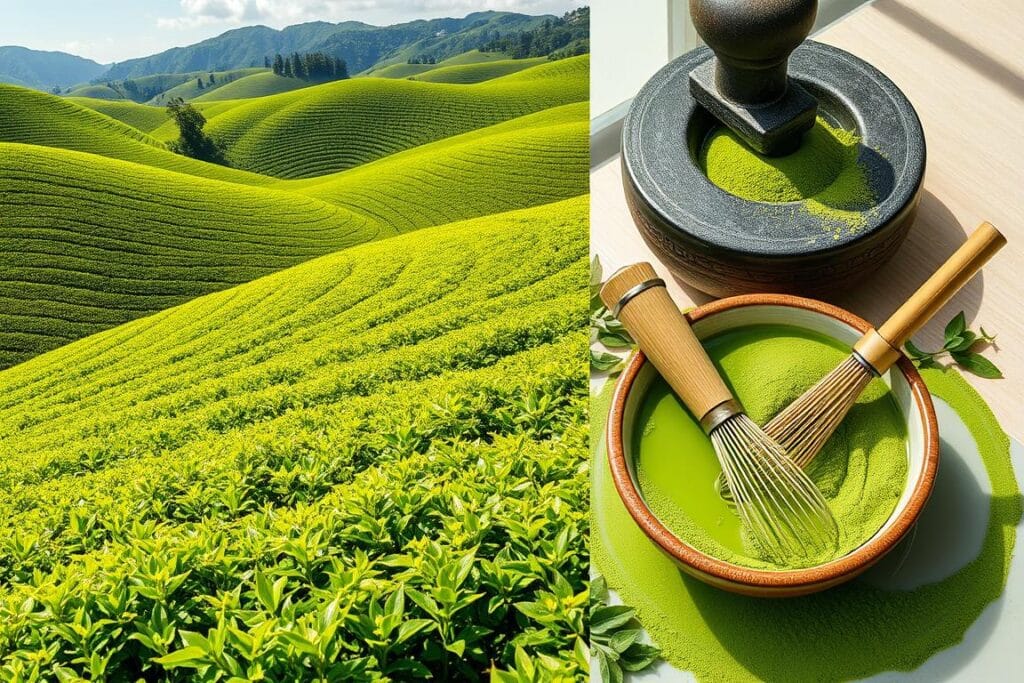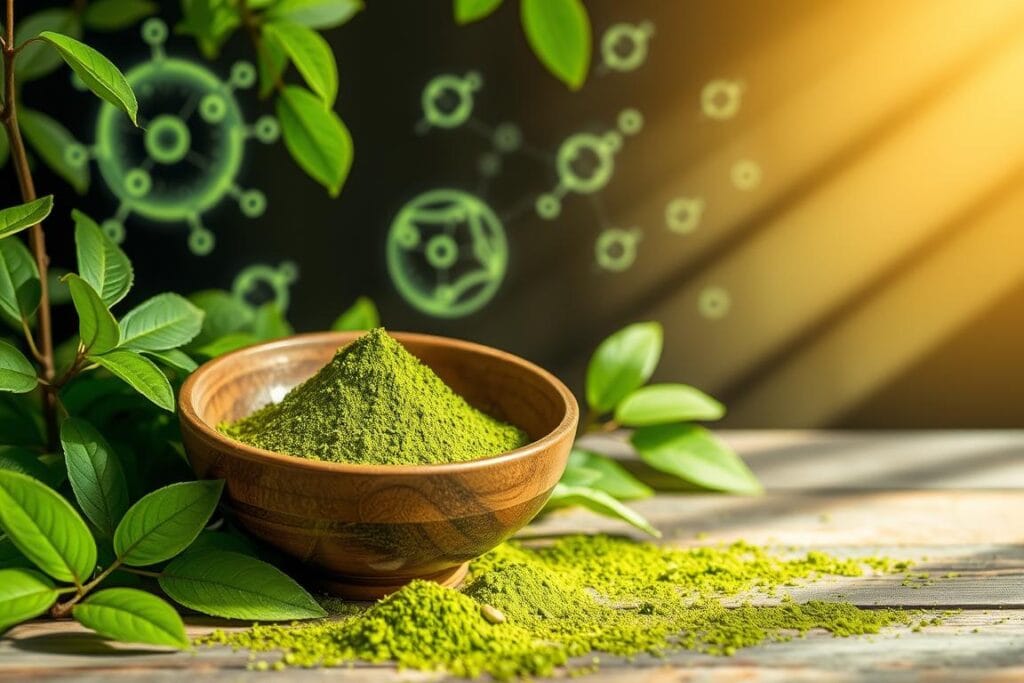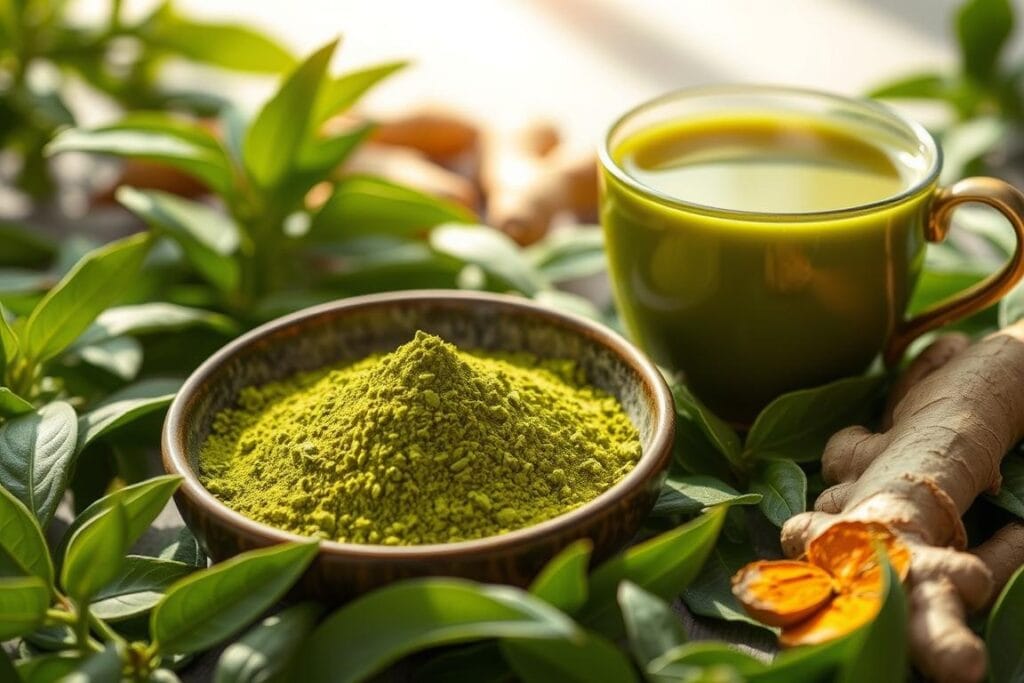- Matcha contains powerful anti-inflammatory compounds called catechins
- One teaspoon provides 60-70 mg of caffeine with calming L-theanine
- EGCG in matcha accounts for 33% of green tea’s beneficial catechins
- Supports possible reduction of inflammation in many body systems
- Can be enjoyed as a drink or in matcha brownies
Understanding Matcha’s Unique Properties and Production
Matcha is a traditional Japanese green tea with special qualities. It’s a vibrant green powder that comes from centuries of tradition and careful growing. This tea is unlike any other.
The Traditional Shade-Growing Process
Matcha starts its journey in Japan’s tea fields. Farmers use a special method to grow the tea leaves in the shade. This makes the leaves very nutritious.
For the last six weeks before picking, the tea plants are covered. This process changes the leaves in amazing ways:
- Increased chlorophyll production
- Enhanced amino acid development
- Reduced bitterness
- Deeper green coloration
Difference Between Matcha and Regular Green Tea
Matcha is different from regular green tea because you drink the whole leaf. This means you get more nutrients. It’s also why matcha is used in so many desserts and sweets in Japan.
Key Nutritional Components
| Nutrient | Benefits |
|---|---|
| Catechins | Powerful antioxidants |
| L-Theanine | Promotes relaxation |
| Caffeine | Sustained energy boost |
| Chlorophyll | Natural detoxifier |
| Vitamin C | Immune system support |

“Matcha is not just a beverage, it’s a cultural experience that connects tradition with modern wellness.” – Japanese Tea Master
Matcha is special whether you enjoy it in traditional sweets or modern desserts. It offers a unique and healthy experience that’s unlike drinking regular tea.
The Science Behind Matcha’s Anti-Inflammatory Effects

Matcha is a top choice for those looking for healthy treats. It’s packed with antioxidants and has strong anti-inflammatory effects. These benefits come from its unique molecular makeup, which goes beyond just being nutritious.
Studies show that matcha has compounds that fight inflammation at the cellular level. The main players are:
- Epigallocatechin gallate (EGCG)
- Catechins
- Polyphenols
EGCG is the main anti-inflammatory in matcha. It blocks pathways that cause inflammation in your body. It’s at least 3 times more concentrated than in regular green tea, stopping the NF-kB protein complex that leads to inflammation.
“Matcha doesn’t just fight inflammation; it strategically disrupts the body’s inflammatory mechanisms.” – Nutrition Research Institute
Matcha’s antioxidants fight free radicals and reduce oxidative stress, which leads to chronic inflammation. It supports your body’s defenses, keeping cells healthy and preventing long-term damage.
| Compound | Anti-Inflammatory Action | Concentration in Matcha |
|---|---|---|
| EGCG | Blocks inflammatory protein pathways | Highest among green teas |
| Catechins | Neutralizes free radicals | Significantly high |
| L-Theanine | Reduces stress-induced inflammation | More concentrated than other teas |
Exploring matcha’s health benefits shows a complex system of protection. This green powder is a nutritional powerhouse against inflammation, working naturally to keep you healthy.
EGCG: Matcha’s Powerful Anti-Inflammatory Compound
Explore the world of superfood sweets and find out about matcha’s amazing anti-inflammatory power. EGCG (Epigallocatechin Gallate) is a top player in the world of healthy treats. It offers big health benefits, more than just green tea.
Explore more about matcha’s anti-inflammatory benefits and how to integrate it into your routine with this guide to healthy eating habits.
How EGCG Fights Inflammation
EGCG is like a superhero in your body, fighting inflammation at its source. This strong antioxidant stops the NF-kB pathway, which starts inflammation. By stopping this pathway, EGCG:
- Reduces cellular inflammation
- Protects against chronic diseases
- Supports overall cellular health
Concentration Levels in Matcha
Matcha is unique because of its high EGCG levels. It has at least 3 times more EGCG than regular green tea. So, every sip of matcha gives you a strong anti-inflammatory effect.
| Tea Type | EGCG Concentration | Inflammation Fighting Ability |
|---|---|---|
| Regular Green Tea | Low | Moderate |
| Matcha Powder | High | Exceptional |
Daily Recommended Intake
To get the most anti-inflammatory benefits, experts suggest drinking 1 to 3 teaspoons of high-quality matcha powder each day. Enjoy it as a warm drink, in smoothies, or baked into treats. You’ll be giving your body a big wellness boost.
“Every cup of matcha is a step towards fighting inflammation naturally.” – Wellness Nutrition Expert
Antioxidant Properties and Their Role in Fighting Inflammation
Explore the world of antioxidants and see how matcha changes your view on healthy treats. Superfoods have been popular for their great nutrition, and matcha is a top fighter against inflammation.
Matcha green tea is packed with antioxidants, like catechins. These are 130 times more potent than regular green tea. They fight off bad free radicals and lower oxidative stress in your body.
- Protects cells from damage
- Reduces inflammation at the cellular level
- Supports cardiovascular health
- Aids in detoxification processes
Adding matcha to your vegan baked goods and wellness routine can be very beneficial. The chlorophyll in matcha cleanses your body by binding to heavy metals and removing toxins.
“Antioxidants are nature’s defense mechanism against cellular damage and inflammation” – Nutrition Experts
Choosing matcha means you’re fighting inflammation naturally. Its high ORAC score helps keep you healthy and prevents chronic inflammation.
Enjoying a matcha latte or trying matcha desserts is a great choice for your health.
. For example, these matcha-infused brownies combine health benefits with rich, chocolaty flavor.
How Matcha Supports Gut Health and Reduces Inflammation
Matcha is more than a trendy superfood. It’s a natural remedy that can change your gut health and boost your immune system.
Matcha stands out as a gluten-free snack for digestive balance. Its natural compounds work together to support your body’s ecosystem.
Impact on Gut Microbiome
Matcha’s compounds help beneficial bacteria grow in your gut. The catechins in matcha:
- Inhibit harmful bacteria
- Promote healthy gut flora
- Reduce inflammation
Digestive Benefits
Matcha boosts your digestive system with its unique nutrients. Chlorophyll in matcha detoxifies your body, removing toxins that harm your gut.
Connection to Immune System
A healthy gut means a strong immune system. Matcha’s EGCG helps:
| Immune System Benefit | Matcha’s Contribution |
|---|---|
| Antioxidant Protection | 3x higher EGCG levels than regular green tea |
| Inflammation Reduction | Natural anti-inflammatory compounds |
| Cellular Health | Supports glutathione production |
“Matcha is not just a drink, it’s a holistic approach to wellness that starts in your gut.”
Adding matcha to your diet is a natural way to improve your digestive health and immune system. It’s one of the best superfood sweets out there.
Delicious Matcha Brownies and Other Anti-Inflammatory Treats
Looking for a sweet treat that’s good for you? Matcha brownies are the answer. They mix chocolate’s rich taste with matcha’s health benefits. These fudgy brownies are both tasty and healthy.
Vegan baked goods are now more exciting than ever. You can make delicious matcha brownies that fit many diets. The secret is finding the right mix of ingredients for great taste and health.
Exciting Matcha Treat Options
- Matcha brownies with a fudgy texture
- Anti-inflammatory energy balls
- Vegan matcha muffins
- Matcha-infused smoothies
- Gluten-free matcha cookies
“Desserts can be both delicious and nutritious when you incorporate matcha!” – Wellness Chef
Here are some tips for making vegan baked goods with matcha:
- Use high-quality matcha powder
- Experiment with different alternative flours
- Balance sweetness with matcha’s earthy notes
- Try adding nuts for extra texture
Make your anti-inflammatory journey sweet with these matcha treats. From rich brownies to energizing snacks, matcha is a treasure trove for dessert lovers.
Incorporating Matcha Into Your Daily Wellness Routine
Adding matcha to your daily routine can be a fun journey. It’s not just about tasty treats. It’s also about boosting your health with a superfood.
Matcha brings a special mix of mental sharpness and physical energy. Its high antioxidant levels make it a great choice for your health plan.
Morning Rituals with Matcha
Begin your day with a matcha routine that wakes you up and feeds you. Here are some morning ideas:
- Make a traditional matcha latte
- Add matcha to your morning smoothie
- Drink a quick matcha shot for focus
- Try matcha-infused overnight oats
Optimal Preparation Methods
Getting your matcha just right is key. The traditional whisking method makes a smooth, frothy drink full of nutrients.
| Preparation Step | Technique |
|---|---|
| Water Temperature | 170-180°F (avoid boiling) |
| Matcha Quantity | 1-2 teaspoons per serving |
| Whisking Method | Zigzag motion with bamboo whisk |
Timing and Dosage Recommendations
For the best matcha benefits, take 1-3 teaspoons daily. It’s best in the morning or early afternoon. This keeps your energy up without messing with your sleep.
Matcha is not just a drink, it’s a wellness experience that nourishes body and mind.
Try matcha in green tea desserts and healthy treats. Matcha energy balls, brownies, or chia puddings can make your routine fun and healthy.
Potential Side Effects and Precautions
Matcha is a superfood sweet with amazing health benefits. But, it’s important to know about possible side effects. Enjoying matcha should be done with care and knowledge.
Matcha has caffeine, which can affect some people. You might feel:
- Mild jitteriness
- Sleep disruptions
- Increased heart rate
- Mild anxiety
Some groups need to be extra careful with matcha:
- Pregnant women
- Individuals with caffeine sensitivities
- People with pre-existing heart conditions
- Those taking specific medications
“Moderation is key when exploring the world of matcha wellness.” – Wellness Expert
Choose high-quality, organic matcha to reduce risks. Look for brands that are transparent about their sources.
| Matcha Consumption Consideration | Recommended Action |
|---|---|
| Caffeine Sensitivity | Start with small quantities |
| Medical Conditions | Consult healthcare professional |
| Pregnancy | Limit intake, seek medical advice |
Remember, how matcha affects you can differ. Pay attention to how your body reacts and adjust your intake.
Conclusion
Matcha is more than just a food; it’s a superfood that boosts your health. Matcha brownies are not just treats but a way to enjoy health benefits. They mix tasty flavors with antioxidants, making desserts healthier.
Matcha is packed with catechins and L-theanine. These help your body fight off diseases. Enjoying matcha brownies is a tasty way to fight stress and boost energy without the caffeine crash.
When you try matcha, remember to use it in moderation and choose high-quality. Whether it’s a brownie or a cup of tea, you’re joining a long tradition of wellness. This can improve your heart health and brain function.
Matcha is not just for foodies; it’s a way to live healthier. It combines ancient Japanese wisdom with modern science. By choosing matcha, you’re picking a mindful, healthy way to eat.

